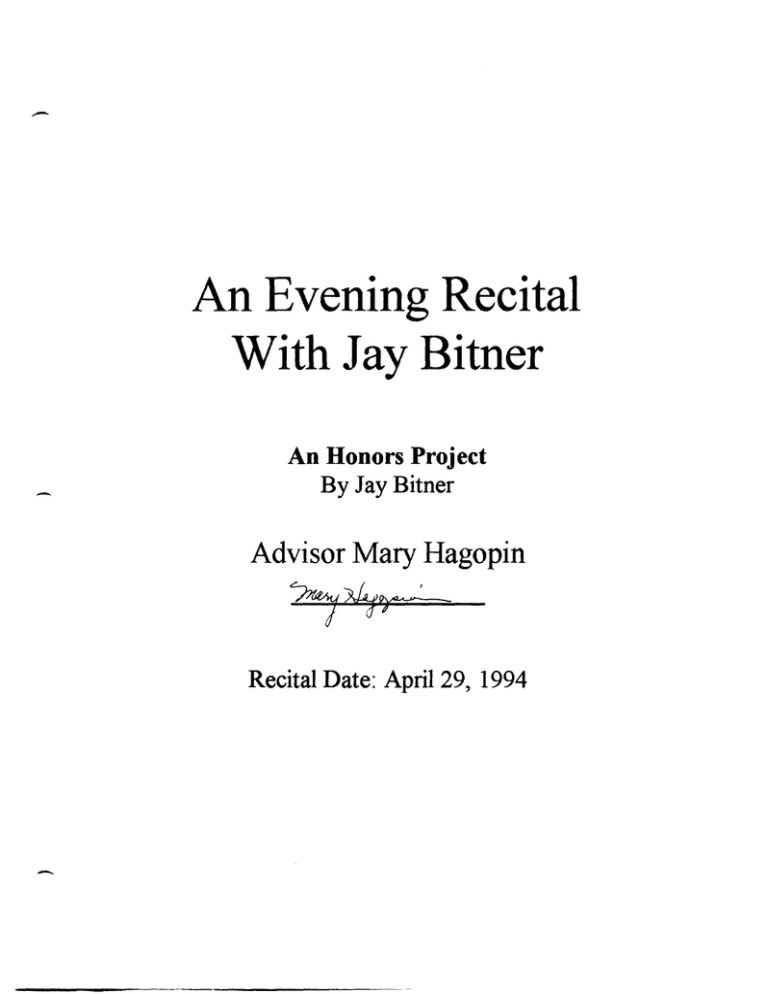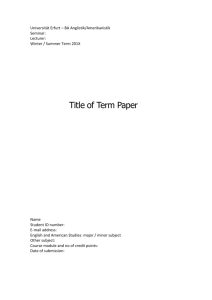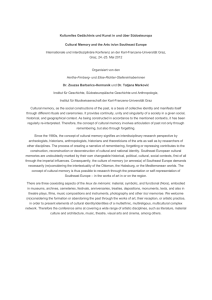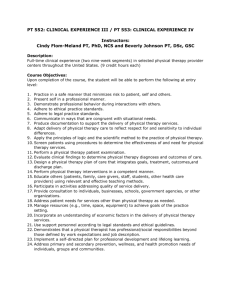- An Evening Recital With Jay Bitner
advertisement

- An Evening Recital With Jay Bitner - An Honors Project By Jay Bitner Advisor Mary Hagopin ~Mt~·,-, - Recital Date: April 29, 1994 - -, The concept ormy senior recital as a honors project began in the tan of 1993. It was at that time my voice teacher, Mary Hagopian, and I began choosing the repertoire that I would sing on April 29th. After much discussion regardillg having a balanced and complete program, we settled on two arias from Bach cantatas, Schumann's Dichlerliebe, Finzi's LeI Us Garlands Bring, and Prince Gremin's aria from Tchaikovsky's Eugene Onegin as a suitable program. In the ensuing months of work, it became evident that singing the Russian would prove too difficult a challenge at this point. Due to the deletion of this selection and in the maintenance of balance another aria needed to be inserted. We decided thatAh! un/oco insolilo would be a good solid aria to close the program with, also addillg a different emotion compared with the serious and somber nature of the program's previous material. Now with the absence of the Russian language, we felt we needed to add some French songs to round out the recital. We came across some pieces by Saint-Saens and decided upon Danse Macabre and L'Atlenle. Now we thought we were set. We had a run through of the program in February and it ran about 7 minutes too long. So we decided to cut one of the Bach arias. TIlls was to be the final program. My practice routine also increased. I had two voice lessons a week the entire semester. In addition I spent from five to eight hours a week in the practice rooms working on my material. In April, following the opera production of Menthe's The Consul, I began to increase the intensity of my rehearsal time. I lived and breathed my recital. Recordings of the works by other artists, and recordings of my voice lessons were the only music I listened to for the rest of the month. I watched no television, read no books for pleasure, and devoted almost every waking hour to my recital. In the end the result convinced me I should have begun this routine earlier, but I was impaired by my role in the opera. TIlls is a lesson that I will apply to future recitals. It was in February as well that I decided upon what to do regarding the publicity of my recital. I spoke briefly on the phone with my sister, Carol-Margaret, an artist, and asked if she would be interested in designing my posters for me. She graciously agreed. Over spring break I decided that in addition to the posters I would run otf, I could have T-shirts made out of the poster design. TIlls would allow me yet another avenue of getting the word out. Also over the break I designed some invitations with my mother, which were sent out in early April to selected faculty and fi:iends. By the time April rolled aroun(~ I had the T-shirts and matching posters on order, to be delivered on April 15th, a full two weeks prior to the performance. It was the following week when I realized that fifty posters were not going to be enough to gain the desired audience size of I 00+. So with the help of my friend Steve Lidy, a graphics arts design major, I designed a new poster from the original concept. We decided to incorporate a black and white photograph of myself into the design. This decision was made because we both thought it was I who would draw people to the performance. After we finished I enlarged it to II "XI4" and ran off two hundred fifty posters at a village copy outlet. That - evening of the 23rd I personally went to every residence hall on campus dropping of8-12 posters at each hall or complex to be distributed throughout the buildillg. The following day I posted the remaining posters throughout the canlpus in every academic building. TIlls method of publicity had the desired effect as there was a head count of 193 people at my recital. Also I sold approximately two dozen T-shirts to friends and another two dozen to family members. Hollische Schlange from Kantate No. 40 by]. S. Bach HOllische Schlange. wird dir nicht bange? Infernal sejpeDt, are you not anxious? Der dir den Kopf ala em Sieger zedmickt, ist nlDl geboren. und die verloren. werden mit ewigem Frieden beglOckt. He who will victoriously crush your head is now bom. and those who are lost. will be filled with everlasting peace. Djcbterliebe When I lean on your breast, I am overcome with heavenly desire; but when you say: I love you! so must I weep bitterly. Wenn ich mich lehn' an deine Brust, kommt's ilbermieh wie Himmelslust; doch wenn du sprichst: ieh Iiebe diehl so muss ich weinen bitterlich. V. Ieh will meine Seele tauchen in den Kelch der Lilie hinein; die Lilie soli k1ingend hauchen ein Lied von der Liebsten mein. I will my soul plunge in the cup within the lily; the lily shall breathe sound a song from my sweetheart. Das Lied soli schauem und beben, wie der Kuss von ihrern MlDld, den sie mir einst gegeben in wundeIbar susser Stund'. The song shall shudder and shake, as the kiss from your mouth, that she once gave me in a wonderful sweet hour. by Robert Schumann I. VI. 1m wundersehOnen Monat Mai. als aile Knospen sprang en. da ist in meinem Herzen die Liebe aufgegangen. In the beautiful month of May, 1m wunderschOnen Monat Mai. als aile VOgel sangen. da bab ich ihr gestanden mein Sehoen und Verlangen. In the beautiful month of May, as all the buds were bursting, in my heart the love sprouting. as all the birds are singing, there I professed to her my longing and desire. n. Aus meinen Thrinen spriessen viel blflhende Blwnen hervor, und meinen Seufzer werden ein Naehtigallenchor. Out of my tears sprout many blooming flowers forth, and my sigh becomes a choir of nightingales. Und wenn du mich Iieb hast Kindchen, schenk' ieh dir die Blwnen all', und vor dienem Fenster soli k1ingen das lied der Nachtigall. And when you love me, my child, I will give you all the flowers, and before your window shall sound the song of the nightingale. m. Die Rose, die Lilie, die Taube, die Sonne, die Iiebt ich einst aile in Liebeswonne. Ieh lieb' sie nieht mehr, ich liebe alleine die Kleine, die Feine, die Reine, die Ene; sie seiber aller Liebe Wonne, ist Rose und Lilie und Taube und Sonne, ieh liebe alleine die Kleine, die Feine, die Reine, die Eine, die Eine! The rose, the lily, the dove, the sun, I loved them all once in love's delight. I love them no more, I love alone the small one, the fme one, the pure one, the one; the same best love's delight, is rose and lily and dove and sun, I love alone the small one, the fme one, the pure one, the one, the one! IV. Wenn ieh in deine Augen seh', so schwindet all' mein Leid und Weh; doch wenn ich kiisse deinen Mund, _~rd ich ganz und gar gesund. When I look in your eyes, so dwindles all my grief and pain; but when I kiss your mouth, so become I whole and quite healthy. 1m Rhein, im heiJigen Strome, In the Rhein, in the holy river, da spiegelt sieh in den Well'n, mit seinem grossen Dome, das grosse heilige Coin. there reflected in the waves, with its great cathedral, the historic holy Cologne. 1m Dom da steht ein Bildniss, auf goldenem Leder gemalt; im meines Lebens Wildniss hat's freundlich hinein gestrahit. In the dome there stands a portrait on golden leather painted; in my life's wilderness has kindly therein radiated. Es schweben Blwnen und Eng'lein wn unsre Iiebe Frau; die Augen, die Lippen, die Lippen, die Wiinglein, die gleichen der Liebsten genau. It suspends flowers and angels around our blessed virgin; the eyes, the lips, the lips, the little cheeks, they resemble my sweetheart exactly. vn. ru not complain, Ich grolle nicht, und wenn das Herz auch brieht, ewig verlor'nes Lieb, ewig verlOl'nes Lieb! ich grolle nicht, ieh grolle nieht. and when my heart also breaks, eternal lost love, eternal lost love! ru not complain, ru not complain. Wie du aueh strahlst in Diamantenpraeht, es flillt kein Strahl in deines Herzens Nacht, das weiss ieh liingsl. As you also gleam with the splendor of diamonds, no rays fall into the night of your heart, that I knew for a long time. Ich grolle nieht, und wenn das Herz auch brichl. ru not complain, Ich sab dichja im Traume, und sab die Nacht in deinesHerzens Raume, und sab die Schlang', die dir am Herzen frisst, ich sah. mein Leib, wie sehr du elend bisl. I saw you yes in a dream, and saw the night in your heart's chambers, and saw the serpent, as it gnawed on your heart, I saw. my love, how very wretched you are. Ich grolle nichl. ich grolle niehl. fll not complain. fll not complain. and when my heart also breaks. VllI. lJnd wOssten's die Blumen, die k1einen, wie tief velWUDdet mein HelZ, sie wiirden mit mir weinen, 211 heilen meinen SchmelZ. And if the little flowers knew, how deeply wounded is my heart, they would weep with me, to heal my pain. Und wOssten's die Nachtigallen, wie iell so traurig und krank, sie liessen frlShlich erschallen erquickenden Gesang. And if the nightingales knew, how I am so sad and sick, they would merrily let forth a refreshing song. Und wiissten sie mein Wehe, die goldenen Stemelein, sie klImen aus ihrer HOhe, und sprllchen Trost mir ein. And if they knew my pain, the golden little stars, they would come down from heaven, Sie all k6nnen's nieht wissen, nur Eine kennt meinen SchmelZ; sie hat ja selbst zemssen, zenissen mir das Herz. They all cannot know, only one knows my pain, yes she herself has tom apart, tom apart my heart. and speak comfort to me. der ihr in den Weg gelaufen; der Jiingling ist I1bel dran. The girl out of anger took the next best man. that came into her path; the young man is badly off Es ist eine alte Geschichte. doch bleibt sie immer neu; und wem sie just passiret, clem bricbt das HelZ entzwei. It is an old stol)', though it always remains new; and to whom it has just happened, then it breaks the heart in two. Das M1idchen nimmt aus Aerger den ersten besten Mann, XII. Am leuchtenden Sonunennorgen geh' ich im Garten herum. Es fll1stem und sprechen die B1umen. ich aber wandie stumm. On a shining summer moming I walk into my garden. the flowers whisper and speak, but I walk silently. Es fll1stem und sprechen die Blumen, The flowers whisper and speak, and look sympathetically at me; Don't be angl)' at our sister, you sad, pale man. und schau'n mit leidig mich an; Sei unsrer Schwester nicht bllse, du trauriger, b1asser Mann. IX. Das ist ein Aliten und Geigen, Trompeten schmettem darein, Trompeten schmettem darein; There are flutes and violins, trumpets blare therein, trumpets blare therein: da tanzt wohl den Hochzeitreigen die Herzallerliebste mein, die Herzallerliebste mein. there dancing at the wedding ceremony the heart dearest of mine, the heart dearest of mine. Das ist ein Klingen und DrlShnen, das ist ein Klingen und DriShnen, ein Pauken und ein Schalmein; There is a kIanging and droning, there is a k1anging and droning, of kettledrums and pipes; dazwischen schluchzen und stOhnen, dazwischen schluchzen und stlihnen die lieblichen Engelein. in between sobs and moans, in between sobs and moans, is the lovely little angel. xm. Ich hab' im Traum geweinet, mir trliumte, du lagest im Grab. Ich wachte auf, und die Thriine floss noch von der Wange herab. I wept in a dream, I dreamt, you laid in a grave. I woke up, and the tears flowed down my cheeks. Ich hab' im Traum geweinet, mirtriiumt', du verliessest mich. Ich wachte auf, und ich weinte noch lange bitterlich. I wept in a dream, I dreamed. you left me. I woke up, and I wept again a long time bitterly. Ich hab' im Traum geweinet, mir tliumte, du warst mir noch gut. Ich wachte auf, und noch immer strOmt meine Thriinen f1uth. I wept in a dream. I dreamed. you were still true to me. I woke up, and still my tears streamed. X. XIV. Hor' ich das Liedchen k1ingen, das einst die Liebste sang, so will mir die Brust zerspringen von wildem Schmerzendrang. Hear I the little song sounding, that once my sweetheart sang, so wants my chest to burst from a fierce pain. Es treibt mich ein dunkles Sehnen hinauf zur Waldeshoh, dort llist sich auf in Thriinen mein iibergrosses Weh'. a darlc longing drives me up there to the height of the forest, and there breaks into tears my enourmous pain. XI. Ein Jiingling liebt ein Mlidchen. die hat einen Andem erwlihlt; der Andre liebt eine Andre. und hat sich mit dieser vermlihlt. A young man loved a girl, who had choosen another. the other loved another. and has manied her. Allnlichtlich im Traume seh' ich dich. und sehe dich freundlich, freundlich grussen, und laut aufweinend sturz' ich mich zu deinen siissen Fussen. EveI)' night I see you in my dreams. and see you wannly, warmly greeting, and crying out loudly I fall upon your sweet feet. Du siehest mich an wehmiithiglich You look at me with melancholy and shakes, shakes the blonde little head; out of your eyes steal forth little tearnrops of pearls. und schUttelst, schilttelst das blondeKopfchen; aus deinen Augen schleichen sich die PerlenthriinentriSpfchen. Du sagst mir heimlich ein leises Wort, und giebst mir den Strauss, den Strauss von Cypressen. You tell me secretly a gentle worn, and give me a bouquet, a bouquet of cypress. Ich wachte auf, und der Strauss ist fort, und's Wort hab' ich vergessen. I woke up, and the bouquet IS gone, and your words have I forgotten. xv. r. .... allen MlIrchen winkt es hervor mit weisser Hand, da singt es und da klingt es von einem Zauberland; Out of an old fail)'-tale it beckons with a white hand, there it sings and there it rings as if from a magic land. wo bunte Blumen blUhen im gold'nen Abendlicht, und Iieblich duftend glUhen, mit briiutlichem Gesicht; where multi-colored flowers blossom in the golden evening light, and lovely fragrantly glowing, with a bridelike face. und gIilne Bliume singen uraIte Melodei'n, die Lilfte heimlich klingen, WId V<Sgel schmettem drein; and green trees are singing vel)' old melodies, the breeze secretly sounds, and the birds loudly sang; WId Nebelbilder steigen wahl aus der Erd' hervor, WId tanzen luft'gen Reigen im wunderlichem Char, and fog shapes ascend forth out of the earth, and join an ail)' round dance forming a wonderful choir, und blaue Funken brennen anjedem Blatt und Reis, und rothe Lichter rennen im irren, wirren Kreis; and blue sparks bum in every leaf and twig, and red light races in an erring, disorderly circle; und laute Quellen brechen aus wildem Marmorstein, und seltsam in den Bachen strahlt fort der Wiederschein. and colorful fountains break forth from wild marble stones, and strangely in the brook radiate reflections. Ach -------! Ach! Ach, konnt' ich dorthin kommen, und dart mein Herz erfreu'n, und aller Qual enlnommen, und frei und selig sein! A b - - - - - - ! Ab! Ab, if I could go there, and there my heart delight, and all torment be released, and free and blessed be! Ach! jenes Land der Wonne, das seh' ich oft im Traum, doch kommt die Morgensonne, zertliesst's wie eitel Schaum, zertliesst's wie eitel Schaum. Ab! that land of joy, that I see often in dreams, but comes the morning sun, dissolves like an empty dream, dissolves like an empty dream. XVI. Die alten, hOsen Lieder, die Trliume bOs und arg, die lasst lUIS jetzt begraben, holt einen grossen Sarg. The ancient, spiteful songs, the dreams spitful and mean, let us now bul)'; get a large coffm. Hinein leg' ich gar Manches, doch sag' ich noch nicht was; der Sarg muss sein noch grosser wie's Heidelberger Fass. Therein I lay much, but I won't say what; the coffm must be even larger than Heidelberg's cask. Und holt eine Todtenbahre, und Breter fest und dick; auch muss sie sein noch llinger, als wie zu Mainz die Bruck'. And get a death stretcher and boards firm und thick; also and it must be still longer, than even the bridge at Mainz. Und holt mir auch zw6lf Riesen, die mils sen noch stiirlc:er sein, als wie der starlc:e Christoph, im Dom zu Coin am Rhein. And get me also twelve giants, the must be even stronger, than the strength of St. Otristoph, in the cathedral in Cologne on the Rhein, Die sollen den Sarg forttragen, WId senken in's Meer hinab; denn solchern grossen Sarge gebUhrt ein grosses Grab. They should carry the coffin away, and sink it into the sea below; for such a large coffm deserves a great grave. Wisst ihr, warum der Sarg wahl so gross und schwer mag scin? Ich senkt' auch meine Liebe und meinen Schmerz hinein. Do you know, why the coffm must be so large and heavy? I sink also my love and my pain therein. L'Attente Waiting Monte, ecureuil, monte au grand chene, Sur la branche des cieux prochaine, Qui plie et tremble conune Wl jonc. Climb, squirrel, climb the large oak tree, To the branch next to the sky, That bends and trembles as a reed. Cigogne aux vieilles tours fi~le, Ob! Vole! et monte a tire d'aile De I'eglise a la citadelle, Do hout clocher au grand donjon. Stork, faithful to the old towers, ObI Fly! and rise with full speed From the church to the citadel, From the high steeple to the grand turret. Vieil aigle, monte de ton aire A la montagne centenaire Que blanchit l'hiver etemel; Old eagle, rise from your eyrie To the mOWltain that is centuries old, which is whitened by etemal winter; Et toi qu'en ta couche inqui~te Jarnais I'aube ne vit muette, monte monte vive a1ouette, vive alouette monte au ciel! And you, on your restless bed, You, whom the dawn never saw mute, Rise, rise lively lark, Lively lark, rise to the sky! Et maintenant, du haut de rarbre, Des fl~ches de la tour de marbre, Do grand mont, du ciel enflarnrne, And now, from the top of the tree. From the spire of the marble tower, From the great mountain, from the enflamed sky, A l'horizon, parmi la brurne, Voyezvous flotter une plume, Et courir Wl cheval qui fume, Et revenir mon bienairne? On the horizon, in the mist, Do you see a fluttering plume And a steaming horse racing And returning my beloved? Et revenir mon bienairne, mon bienairne. mon bienaime? And returning my beloved, my beloved, my beloved? Danse Macbre Dance of Death Zig et zig et zig, La mort en cadence Frappant Wle tornbe avec son talon, La mort aminuit joue Wl air de danse, Zig et zig et zag, sur son violon. Zig and zig and zig, Death in cadence Is knocking at a tomb with his heel. Death at midnight plays a dance, Zig and zig and zag, on his violin. Le vent d'hiver souffle, et la nuit est sombre; Des genussernents sortent des tiUeu1s; Les squelettes blancs vont a travers I'ombre. Courant et sautant sous leurs grands lincuels. The winter wind blows, and the night is somber; Sighs come forth from the linden trees; The white skeletons pass in the shadows, RulUling and jumping under their great shrouds. Zig et zig et zig, chacun se tremousse. On entend claquer les os des danseurs: Un couple lascif s'asseoit sur la mousse, Cornrne pour goiiter d'anciennes douceurs. Zig and zig and zig. everyone is frisking about. One hears the rattling bones of the dancers. A lascivious couple sits down on the moss As if to taste the ancient delights. Zig et zig et zag, la mort continue De racier sans fm son aigre instrument. Un voile est tornbe! La danseuse est nue. son danseur la serre amoureusement. Zig and zig and zag, death continues To scrape endlessly on his shrill instrument. A veil has fallen! The dancer is nude, Her partner clasps her amorously, La dame est, diton, marquise ou baronne. Et Ie vert galant un pauvre charron; Horreur! et voila qu'elles'aban dOlUle Cornrne si Ie rustre etait un baron. Zig et zig et zig, quelle sarabande! Quels cercles de morts se donnant la main! Zig et zig et zag, on voit dans la bande Le roi gambader aupres du vilain. Mais psi!! tout a coup on quitte la ronde. On se pousse. on fuit. Ie coq a chante. Ob! la belle nuit pour Ie pauvre monde. Et vivent la mort et l'egalite! The lady, they say, is a marquise or a baroness, And her gallant cavalier a poor wheelwright, Horrors! and here she throws off all restraint As if the peasant were a baron. Zig and zig and zig, what a sarabande! What circles of the dead. holding hands! Zig and zig and zag, one sees in the crowd The king romping next to the villain. But hush, suddenly they stop their round, They push. they flee. the cock has crowed. Ob! A beautiful night for the poor world. And long live death and equality! Ah! un (oco insolito from "Don Pasquale" The scene is Rome; the time is the early nieteenth cenlillY. The central character, Don Pasquale is an aged, wealthy bachelor who wants to get married. He is fair game for anyone. Presently the Don's old friend Dr. Malatesta, joins him. Malatesta has found what Pasquale wants - a beautiful young girl to be his bride, and Malatesta describes her in his aria Bella siccome un amgelo (Just as beautiful as an angel). Who is she? Why she is my sister, say Malatesta. Pasquale is so delighted he ignores Malatesta's warnings about rushing into marrige. Instead, he pushes his friend from the house and demands that this beauty be brought to him at once. Then Don Pasquale sings an aria of foolish soliloquy (Ah! un foco insolito)in which he already imagines himself the father of six! All. un foeo insoIito mi sento addosso, omai ressistere io pin non posso, dell' eta vecchia sooroo i maIanni, mi sento giovine come a vent'anni, All. a fire inside me fIlls my body, deb, cam affreitati, vieni sposina, ecco di bamboli mezza dozzina gil veggo nascere. gia veggo crescere. a me dintomo veggo scherzar. Ab. hither quickly. a fair-bride he's found. I can even now a half dozen children watching them be bom. watching them grow. all around me playing. vieni, vieni, Come. come, without the fire inside my body. I shall fmd death. love prompts my heart longingly, age fades in the distance, I look a scarce twenty years old, see ch~ un fceo in solito mi sento addosso, o casco morto qw. Ab----un fceo solito ....•••• A note of special thanks to: Mary Hagopian. Bernard Sell. Nelson. Sara, Kathryn. Bridget. Bryan, Rose, Steve Perry. Kati Sinclair. J.D. Fountain, Russ. Carol-Margaret, Steve Lidy. Mrs. Albright. Freida Roberts. Noel-Carol. David Hagelstein. and the support and love of all my friends in the OIamber choir and the School of Music. Without these people. my family. and God this evening would not have been possiblle. Thank you! Love, ,/1 / L---i 0.;I I Composer Notes for An Evening Recital with Jay Bitner HOilische Schlange from Kantate No. 40 They Bach family is one that can be traced from the early 16th century to the present. The family has a long tradition of musicianship, yet none so pronounced as that of Johann Sebastian Bach born on March 21, 1685. His father, Johann Ambrosius Bach, was a town musician in Eisenach, who played violin, organ. and trumpet. J. S. Bach the youngest of eight children enrolled in the Eisenach grammar school and sang in the church choir. At the age of ten J. S. Bach's father died and he was looked after by his eldest brother Johann Christoph Bach. Johann Sebastian did well in school showing a strong inclination towards theology. he also gained a sound musical education through his brother, J. C. Bach, who was organist at the small town of Ohrdruf, and a former pupil of Pachelbel. It was at this time that J. C. found his brother J. S. a paid position in the choir of St. Michael's Liineburg. He was allowed to remain there even after his voice broke, it is assumed due to his ability to play various instruments. By the age 17 he began to look for a more permanent position and after a brief run as a violinist in the orchestra of the brother of the Duke of Weimar, J. S. Bach went on to become the organist and choirmaster of the new church of St. Boniface in Amstadt. Here Bach's innovations on the organ during services were disapproved by the church council, so Bach moved on to an organist position at the church of St. Blasius at Miihlhausen, a free city. Soon disputes broke out between factions of orthodox Lutherans and more puritan Pietists which threatened to restrict what music could be performed there, so in June of 1708 he accepted the post of organist and court musician to Duke Wilhelm Ernst of Weimar. In his few years at this post, Bach took the time to widen his perspective from that of keyboard pieces, by studying the modem Italian concerto style, transcribing works by Vivaldi and others. By 1713 he was looking for a better paid post and in 1714 was promoted to the post of Konzertmeister (director of the court band), which involved the composition of a cantata each month. He adopted a new cantata style, using the Neumeister type of text, in which recitatives and arias of a quasi-operatic nature were included and the chorus was of lesser importance. The aria sung this evening is from the No. 40 of these cantatas. The style of this aria, as well as the entire cantata utilizes this Neumeister text. Dichterliebe Robert Schumann was born on June 8. 1810. the youngest of five children, whose father was a notable citizen, who made his living as a bookseller but also wrote novels and translated the works of Byran. Robert was educated rust at private a private school and then at the Zwickau Grammar School. His father died in 1826. his sister thereupon committed suicide. and he was then somewhat spoiled by his mother. being indulged to expensive tastes, such as champagne and cigars. while still in school. While enrolled at Leipzig University in 1828 as a student of law, he continue living the good life instead of studying. He began to take piano lessons from a notable teacher, Wieck. at that time as well. After transferring to Heidelberg University and taking the customary Grand Tour in Italy, he was [old by the Professor of Law that he had no talent for the subject. He thus began studying the piano seriously on the advice of Wieck, in whose house he lived; but was left in no doubt that while he might become a piano virtuoso, he more than likely would become a piano teacher. In any event, his ambitions as a piano player were ruined by a device used to strengthen the fingers. Fortunately at this time he had begun to talent as a composer, writing mainly for the piano. His piano writing is extremely individual. using the sustaining pedal and the middle range of the instrument to make a sensuous, rather brilliant tone. In 1837, after various indecisive affairs with several women, he fell in love with Wieck's daughter, Clara. As of yet his ability to make a career as a composer had not come to fruition, which probably explains Wieck's refusal to Schumann marrying her daughter. Nor was Robert particularly in good health. having suffered a nervous breakdown in 1834 following the deaths of one of his brothers and his sister-in-law. By 1839 however Schumann's own compositions began selling well and he decided to take legal steps to break Wieck's veto. and married Clara in 1840. one day prior to her 21st birthday. The result of this passionate and torrid affair was what is known as Schumann's 'song year'. Rarely in music are the connections between exterior events and individual pieces of music so clear. In 1840 he composed a great many songs. including the two great song cycles Frauenliebe und -Leben and Dichterliebe. The verse is mainly subjective and so easy to relate to his feeling that the songs are extraordinarily personal in nature. Technically, his transference of his new piano idiom to the accompaniments allows still greater expressiveness. especially in preludes and postludes where the piano comments on and expands the sentiments of the verse. Schumann went on to compose symphonies, concertos and other great works. This and his criticism allowed him to support Clara and their seven children. But in February of 1854 he began to show signs of serious mental trouble. attempting suicide by throwing himself into the river Rhine (he was rescued by fisherman). He was then taken to a private asylum near Bonn, where he spent the remainder of his days. L'Attente Danse Macbre Camille Saint-Saens was born on October 9, 1835 in Paris France. His father died shortly after his birth and he was brought up by a musical mother and a highly intelligent, well-educated great aunt, who discovered his musical talents and his keen intelligence in other subjects at a very early age. He started to give piano recitals when still a young boy, entering Paris Conservatoireat the age of 13, were he studied composition with Halevy as well as piano and organ. By 1853 he had a symphony publically performed, which was much praised by Gounod. Soon he became highly popular as a concert pianist and composer, and in December of 1857 was appointed organist at the Madeleine, one of the most important of Parisian churches. By the 1860's Saint-Saens was fully established as a composer. His concertos were performed by the leading virtuosos of the day and in Germany was considered one of the most progressive of French musicians. He was largely responsible for the introduction of the symphonic poem to France, and of his own works Le rouet d'Omphak and Danse Macabre were highly successfull. The same feelings evoked in Saint-Saens symphonic poems can be felt in is compositions for voice. Texutres and colors as designated by the piano are clearly punctuated and lifted by the line of the vocal melody. It is even a little known fact that Danse Macabre was written for voice. ~ it was set for orchestra as a symphonic poem. Let us Garlands Bring Gerald Finzi was born in London, England on July 14, 1901. He studied privately with Sir Edward Bairstow and R.O. Morris. Apart from periods of time spent teaching at the Royal Academy of Music and of government service during the war. he lived queitly in the country composing music and conducting amateur orchestras. He made a notable contribution to English song, especially in his many Hardy settings. Finzi composes English songs in which lyrical vocal lines are acutely sensitive to the words. Gerald Finzi died in Oxford, England on September 27, 1956. Ah! un foco insolito from "Don Pasqua/e" Gaetano Donizetti was born on Novamber 29. 1797. The Italian composer was taught by the composer Johann Mayr, one of the earliest men to conduct the later works of Haydn, Mozart, and Beethoven inItaly. Donizetti was eventually sent to public subscription to study with the most famous teacher of counterpoint of his time, Padre Mattei. His first opera to be produced was given in Venice in 1818, to be followed by a number of oneact farces: but his real operatic career began in 1822 when the success of opera seria, Zoraide di Granata, in Rome. This led to contact with neapolitan theatres which was to grow into his appointment as resident composer inthe years immediately after 18265. During this time he wrote usually three or four operas each year, giving him a facility which continued to the end of his career. His internaitional fame grew with Anna Bolena, produced in Milan in 1830. This was a fortunate time for Donizetti. due to that it was then that Rossini gave up composing for the operahouse. In the ensuing decade Donizetti became one of the wealthiest and most productive of all composers (save possibly Verdi). After the death of Gaetano's wife in 1838, his unhappiness in Naples prompted him to write a great deal for the Paris theatres, where Po/iuto, banned for political reasons in Italy, was produced in 1840. A number of his best operas including Lajavorite (1840) and Don Pasquale (1843) date from these year. But by then Donizetti was showing signs of the illness. cerebrospinal meningovascular syphilis. which was to kill him. By the winter of 1843-4 he was in too nervous a condition to compose. adn the following year he was declared insane, spending the rest of his life in several asylums. Bibliography Simon, Henry W. 100 Great Operas and Their Stories, New York, Doubleday, 1960. Plantinga, Leon Romantic Music: A histOlY of Musical Style in Nineteenth-Centwy Europe, New York, W. W. Norton & Company, 1984 Young, W. Murray The cantatas of J.S. Bach: an analytical guide.., Jefferson, N.C., MacFarland, 1989 Whittaker, W.G. The cantatas of Johann Sebastian Bach, sacred and secular., London, New York, Oxford University Press, 1959 Robertson, Alec The church cantatas of J.S. Bach., London, Cassell, 1972 Taylor, Ronald Robert Schumann, his life and work, New York, Universe Books, 1982 Schumann, Robert (compiled by Whitwell, David) Schumann,a self portrait in his own words, Northridge, CA, Winds, 1986 Hallmark, Rufus E. The genesis of Schumann's Dichterliebe : a source study, Ann Arbor, rvn, UNlI Research Press, 1979




